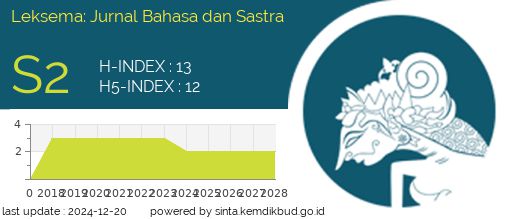THE REPRESENTATION OF POWER HEGEMONY IN THE COLONIAL AND NEW ORDER ERA IN 'BALADA SUPRI' NOVEL (REPRESENTASI HEGEMONI KEKUASAAN PADA ZAMAN KOLONIAL DAN ORDE BARU DALAM NOVEL 'BALADA SUPRI')
DOI:
https://doi.org/10.22515/ljbs.v5i1.2107Keywords:
colonial era, New Order era, social structure, form of powerAbstract
The purpose of this research is to describe the social structures and the forms of power as well as their repetition from colonial era to New Order. This study used a sociological approach to literature with the theory of power hegemony proposed by Gramsci. This research was a type of descriptive-qualitative research. The data in this research are narratives, dialogues, and monologues quoted from the novel Balada Supri written by Mochamad Nasrullah. The results of this research showed that in the colonial era, th social structure consisted of colonizer and colonized group whereas in New Order era, there were government official group, which was supported by the capital owner group, and ordinary people group. In regard with the form of power, colonial era showed the dominance of violence and hegemony that was countered by native resistance through violence sas well. Meanwhile, in New Order era, there appeared to be violence and hegemony dominance with the resistance in the form of hegemony over intellectuals. On the other hand, the social structure and the form of power in the colonial era, particularly the dominance of violence, still continued in New Order era and was termed as neocolonialism.
Downloads
References
Amin, Khairul. 2017. “Elit dan Kekuasaan pada Masyarakat Desa.†Jurnal Sosiologi USK Media Pemikiran & Aplikasi 11 (2). http://jurnal.unsyiah.ac.id/JSU/article/view/ 10096/
Ananta, M. Abroor Firman. 2017. “Novel Tan Sebuah Novel Karya Hendri Teja: Kajian Postkolonialisme.†Bapala 4 (1). https://jurnalmahasiswa.unesa.ac.id/index.php/ bapala/article/view/19631/
Anwar, Ahyar. 2015. Teori Sosial Sastra. Yogyakarta: Penerbit Ombak
Ardiono, Haerun Nisa, & Erny Harijaty. 2019. “Ketidakadilan Sosial dalam Novel Pulang Karya Leila S. Chudori (Tinjauan Sosiologi Sastra).†Bastra: Bahasa dan Sastra 4 (1): 90-105. http://ojs.uho.ac.id/index.php/BASTRA/
Batubara, Ulfah Nury, & Aman. 2019. “Perkembangan Pembelajaran Sejarah Pasca Kemerdekaan-Reformasi.†Jurnal Pendidikan Sejarah 8 (1). http://journal.unj.ac.id/ unj/ index.php/ ips/issue/view/858/
Endraswara, Suwardi. 2013. Metodologi Penelitian Sastra: Epistemologi, Model, Teori, dan Aplikasi. Yogyakarta: Center for Academic Publishing Service
Faruk. 2015. Pengantar Sosiologi Sastra: Dari Strukturalisme Genetik Sampai Post-Modernisme. Yogyakarta: Pustaka Pelajar
Gramsci, Antonio. 1971. Selections from the Prison Notebooks. New York: International Publishers
Gramsci, Antonio, Richard Bellamy, & Virginia Cox. 1994. Gramsci Pre-Prison Writings. Cambridge: Cambridge University Press.
Hadi, Dwi Wahyono, & Gayung Kasuma. 2012. “Propaganda Orde Baru 1966-1980.†Verleden 1 (1). https://journal.unair.ac.id/
Harkantiningsih, Naniek. 2014. “Pengaruh Kolonial di Nusantara.†Kalpataru 23 (1). https://doi.org/http://dx.doi.org/10.24832/kpt.v23iI.51/
Hilman, Iman. 2017. “Imperialisme Dan Kolonialisme.†Paper Universitas Indonesia. http://staff.ui.ac.id/
Irwan, Alexander, & Edriana. 1995. Pemilu - Membatalkan Asas Luber: Hegemoni Tak Sampai. Jakarta: Pustaka Sinar Harapan
Legowo, Sivfian Hendra, IG. Krisnadi & Hendro Sumartono. 2013. “Dinamika Politik Rezim Orde Baru di Indonesia: Studi Tentang Kegagalan Konsolidasi Politik Rezim Orde Baru Tahun 1990-1996.†Publika Budaya, 1 (1). https://jurnal.unej.ac.id/index.php/ PB/article/ view/334
Marlina, Dewi. 2017. Analisis Poskolonialisme Dalam Novel Tanah Surga Merah Karya Arafat Nur. (Skripsi Universitas Maritim Raja Ali Haji). http://jurnal.umrah.ac.id/ wpcontent/uploads/gravity_forms/.
Mujianto, Gigit. 2019. “Peningkatan Hasil Belajar Menyusun Teks Laporan Hasil Observasi Pada Peserta Didik Kelas X SMAN 7 Malang Dengan Model Pembelajaran Integratif.†JINoP:Jurnal Inovasi Pembelajaran, 5 (1): 39. https://doi.org/10.22219/ jinop.v5i1.7244
Nasrullah, Mochamad. 2019. Balada Supri. Jakarta Utara: Penerbit Anagram
Patria, Nizar & Andi Arief. 2015. Antonio Gramsci: Negara & Hegemoni. Yogyakarta: Pustaka Pelajar
Purnaweni, Hartuti. 2004. “Demokrasi Indonesia: Dari Masa ke Masa.†Jurnal Administrasi Publik, 3 (2). http://eprints.undip.ac.id/5316/
Sanita, Meigitaria & Puji Rianto. 2018. “Hantu PKI dan Ujung Rekonsiliasi (Analisis Framing Pemberitaan PKI Era Presiden Abdurrahman Wahid dan Joko Widodo Pada Majalah Tempo Dan Gatra).†Jurnal Komunikasi, 12 (2). https://journal.uii.ac.id/
Sarbini, Ibin. 2017. Kiprah Pelajar Islam Indonesia (PII) dalam Kancah Perpolitikan Pada Masa Transisi Pemerintahan di Indonesia Tahun 1965-1967. Serang: Universitas Islam Negeri Sultan Maulana Hasanuddin
Septian, Aldi. 2018. “Cakrabirawa dalam Kekuatan Militer Era Kepemimpinan Soekarno 1962-1967.†Jurnal Prodi Ilmu Sejarah, 3 (4). https://jpurnal.student.uny.ac.id/
Sugiarti. 2016. “Kesadaran Ketuhanan Tokoh Utama dalam Kumpulan Cerpen Ketika Mas Gagah Pergi dan Kembali Karya Helvy Tiana Rosa.†Kembara: Jurnal Keilmuan Bahasa, Sastra dan Pengajarannya, 2 (1): 90-97. https://doi.org/https://doi.org/ 10.22219/ KEMBARA
Sugiyono. 2009. Metode Penelitian Kuantitatif, Kualitatif, dan R & D. Bandung: Alfabeta
Suhar, Muhammad, Yusak Hudiyono, & Irma Surayya Hanum. 2019. “Analisis Novel Tanah Surga Merah Karya Arafat Nur: Sebuah Kajian Hegemoni Gramsci.†Jurnal Ilmu Budaya, 3 (4). http://e-journals.unmul.ac.id/index.php/jbssb/
Supriyadi, Hasan. 2018. “Gaya Kepemimpinan Presiden Indonesia.†Jurnal Agregasi, 6 (2). https://ojs.unikom.ac.id/index.php/agregasi/article/view/1136/
Wardhani, Baiq LSW. 2017. “Respon Poskolonial Terhadap Intensifikasi Pendidikan Kolonial di Afrika.†Jurnal Global & Strategis, 10 (1): 137. https://doi.org/10.20473/ jgs.10.1.2016.137-151
Downloads
Published
Issue
Section
License
The copyright of the received article shall be assigned to the publisher of the journal. The intended copyright includes the right to publish the article in various forms (including reprints). The journal maintains the publishing rights to published articles.
In line with the license, the authors and users (readers or other researchers) are allowed to share and adapt the material only for non-commercial purposes. In addition, the material must be given appropriate credit, provided with a link to the license, and indicated if changes were made. If authors remix, transform or build upon the material, authors must distribute their contributions under the same license as the original.







